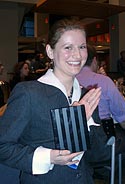Doctoral student shares experiences from Nobel laureates meeting

Slaybaugh
From June 29-July 4, UW–Madison nuclear engineering doctoral student Rachel Slaybaugh was among nearly 500 young researchers from around the world to attend the Lindau Meeting, a unique event in Lindau, Germany, that draws 25 Nobel laureates for lectures, panel and roundtable discussions, and social and networking events.
Slaybaugh, who also is pursuing a Ph.D. minor in energy analysis and policy, is studying the total statistical error present in computer simulations of nuclear systems. (The U.S. Department of Energy Office of Fusion Energy Sciences funds her research via the UW–Madison Fusion Technology Institute.) She currently is conducting Ph.D.-related research at Forschungszentrum Karlsruhe, a research laboratory in Karlsruhe, Germany. Here, Slaybaugh talks about her experiences at the Lindau Meeting.
Q: How, generally, was each day of the meeting structured?
A: Each morning, beginning at 9 a.m., we had three 30-minute lectures from different laureates. Then we had a 15-minute coffee break and usually three more 30-minute lectures. The speakers tended to be at least loosely grouped by topic. On one day there was a panel on climate change and energy during the second portion of the morning. Next we had about two hours for lunch. Every day, the United States had a lunch arranged with other countries that some of the U.S. students could attend. For example, I got to go to lunch with the Chinese delegation, and my roommates got to go with India.
In the afternoon, there was a two-hour discussion session with the laureates. Each person who had spoken in the morning had a discussion section, and we got to choose which one we wanted to go to. Some evenings we had events, and some nights we were free. There was dinner and a dance on the first night; the United States hosted dinner with some laureates on the second night; there was a symphony on the third night; and a traditional Bavarian get-together on the fourth night.
Q: Talk about your one-on-one time with the laureates. What did you ask, and what did you take away from each conversation?
A: There was a chance to talk with the laureates every day in the discussion sessions. I attended William Phillips (physics, 1997), Robert Richardson (physics, 1996), Martinus Veltman (physics, 1999) and Douglas Osheroff (physics, 1996). I asked Richardson about why he liked to teach introductory physics courses, and I made some comments about nuclear power (it was a big topic after the energy panel) during the Osheroff discussion. I also got to eat lunch with Peter Grunberg (physics, 2007). He told us about what he discovered and I told him a bit about helium-3 fusion. We also discussed some general stuff about traveling and winning the Nobel Prize. From many of these discussions, I got the feeling that even the Nobel Prize winners are “regular” people, and so they were more approachable for this reason.
Most of the laureates focused on key steps and traits and outlooks that enabled them to do the wonderful research they did, so this was most of what I took away. They focused a good deal on looking closely at what appears to be failure, keeping an open mind and on working hard but being able to take a step back to get some perspective. I also learned some things about physics I didn’t know before. It was great to see what is on the cutting edge in so many different parts of the field.
Q: How will the “technical” portions (roundtable discussions, panels, lectures, etc.) of the meeting benefit you as a researcher and engineer?
A: The biggest benefit was thinking about the overall approach to research. None of the laureates at the meeting really do anything related to what I do, so it was the information about the “how” that was most helpful for my research. Additionally the climate/energy panel was really interesting for me. There was a big focus on nuclear power, and I spent the rest of the week answering a lot of questions from the other students; this was the best thing for me.
Q: What did you enjoy most about the meeting, and why?
A: I think I enjoyed the discussion sessions the most because we really had a chance to ask a lot of things — both technical and non-technical questions. The laureates really seemed to enjoy talking with us and sharing their perspective and expertise.
Q: Throughout this meeting, you had the opportunity to meet many peers from around the world. How do you plan to continue those relationships?
A: I made many contacts from around the United States as well as from around the world. I think that I will keep in touch with some of these new contacts (there are too many to keep track of everyone). The Internet is an amazing place: We already have made Facebook groups to share thoughts and photos from the meeting. E-mail makes keeping in touch much easier. There are a few people who are not too far from Karlsruhe, and we are planning to meet while I am here. We have also talked about having some regional reunions in the United States.
It’s pretty neat for me because I wouldn’t have met any of these people otherwise, as they are not in my field. I really think it helps to communicate with other disciplines sometimes so you know what is going on in other parts of science and you can see what challenges other people are facing.
Q: Is there anything else you’d like to add?
A: I’d like to express my thanks to my sponsors (the U.S. Department of Energy) for the experience and recommend that they keep sending students in the future. It was an amazing experience.
